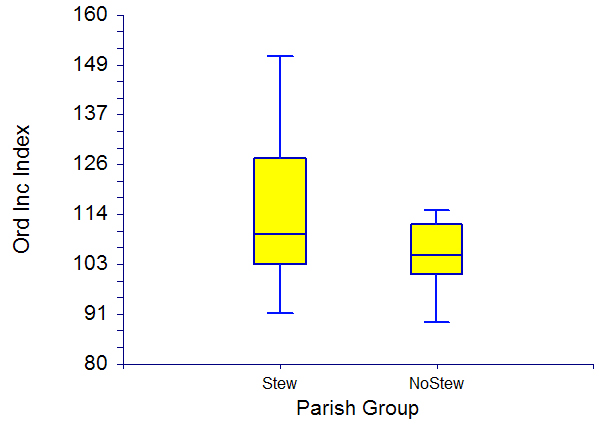 There is a common perception among leaders in the Catholic Church, both clerical and lay, that the promotion of stewardship is highly desirable. In addition to stemming from a positive theology, this perception is based upon the assumption that stewardship makes an important difference in the life of a parish, resulting in an increase in time, talent, and treasure. There is a dearth of solid methodological research, however, that addresses the key research question: Does stewardship actually work at the parish level?
There is a common perception among leaders in the Catholic Church, both clerical and lay, that the promotion of stewardship is highly desirable. In addition to stemming from a positive theology, this perception is based upon the assumption that stewardship makes an important difference in the life of a parish, resulting in an increase in time, talent, and treasure. There is a dearth of solid methodological research, however, that addresses the key research question: Does stewardship actually work at the parish level?
This research attempts to answer this question by examining stewardship of treasure among parishes in the Rockford Diocese. While a full understanding of stewardship also incorporates a stewardship of time and talent, the variables are difficult to collect and would probably lead to methodological issues of reliability.
This research used a pretest/posttest model where the intervening event is the transfer of a pastor with a high stewardship rating (according to diocesan standards) to a new parish. The 13 pastors with the highest stewardship ratings were selected, and longitudinal parish income data was examined to see what happened to income after they were transferred to their current assignments. To control for demographics, diocesan programs and secular events outside of the parish’s purview that could influence commitment, each of these 13 parishes was closely matched with another parish in the same size and socio-economic category, but without a pastor change. Changes in ordinary income were measured across parishes by creating indices that used the year of pastor transfer as the base year.
The research focused on the change in parish ordinary income two years after the pastor transfer, giving some time for a stewardship emphasis to begin bearing fruit. Unfortunately two pairs of parishes dropped out of analysis because the corresponding high stewardship pastors had not yet completed their second year as pastors. Even with this loss, results were notable. The mean of the 11 high stewardship pastor parishes was 114.4 (meaning a 14.4% increase in parish income) while the mean of the matched parishes was 104.9 (a 4.9% increase). This is a significant difference at the 0.02 level.
These results can be vividly seen in the attached chart, which depicts the distribution of ordinary income two years after a pastor with a high stewardship rating arrived. The “whiskers” at the top and bottom show the full range of income scores. The yellow bars show the scores at the 25th and 75th percentile while the horizontal bars show the median scores.
While it would be desirable to say that this research definitely shows that stewardship is always effective in raising parish income, some caveats apply.
First, this research did not measure the results when any pastors committed to stewardship were transferred but when the best stewardship pastors were transferred. The results may represent the high end of expectations and overstate the results of embracing stewardship. Simply put, ordinary pastors that embrace stewardship may not do as well.
Second, it is possible that the matched parishes were practicing some form of stewardship themselves. Parishes were matched on demographic characteristics, not on stewardship. Post hoc inspection of the pastor stewardship ratings of matched parishes shows that four of the 11 pastors had moderate stewardship ratings. This means that this research may have actually measured the effects of the best stewardship pastors against at least some good stewardship pastors. Understood this way, the research may understate the potential effects of stewardship.
Finally, one must ask the logical question: “If stewardship works, why aren’t the differences between high stewardship pastor parishes and the matched parishes even higher?” At least four answers are possible.
1. Parish ordinary income always reflects the popularity of the pastor, at least to some degree. This will be true regardless of the emphasis on stewardship. People in the pews may find it easier to contribute to a parish whose pastor is genuinely pleasant, even if he doesn’t promote stewardship, than they are to contribute to a parish whose pastor is not genial, even if he embraces stewardship.
2. Parish ordinary income may reflect the immediate needs of the parish. A leaking roof will always engender a good response, even without a stewardship emphasis.
3. Parishioners may use their contributions as a way to indicate approval or disapproval of a pastor change. A strong stewardship pastor may find it difficult in his new parish, at least initially, if he replaced a popular pastor. This is especially true if attention was not paid to details of the transition.
4. There may be other parish dynamics that manifest themselves in ordinary income. If parishioners perceive that they do not have a voice in parish affairs, e.g. the pastoral council is moribund or dysfunctional, they may choose to leave the parish or decrease their contributions. While a strong stewardship pastor may help lessen such effects, they still may be present.
Stewardship does work but complicated parish dynamics may mask its full effects.
